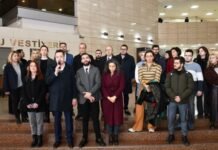Former Turkish military officer Nuri Gökhan Bozkır, implicated in the 2002 murder of academic Necip Hablemitoğlu and convicted of shipping explosives to the Islamic State in Iraq and the Levant (ISIL), has been captured seven months after he evaded authorities, Turkish Minute reported.
The Şanlıurfa 2nd High Criminal Court sentenced him to almost 22 years in prison for “supplying weapons to a terrorist organization” and issued an arrest warrant on July 3. However, authorities were unable to locate him.
Bozkır was apprehended in Ankara on January 2 in a joint operation conducted by the Ankara Police Department’s counterterrorism and intelligence branches.
An Ankara court arrested Bozkır, according to a report by the T24 news website.
Bozkır’s capture comes after a series of events that have raised questions and concerns regarding the Turkish justice system’s handling of high-profile cases.
In the Hablemitoğlu murder case, Bozkır had been released from pretrial detention on May 19, 2023, along with other suspects, due to the possibility of a change in evidence in their favor. The decision to release Bozkır and the others had drawn criticism and left the Hablemitoğlu family and the public demanding justice.
Bozkır had been arrested in Ukraine by Turkish intelligence agency MİT in late January 2022 and was later arrested by a Turkish court on charges related to both the unsolved murder of Necip Hablemitoğlu and his involvement in delivering explosives to ISIL.
A former military officer who had served in the Turkish Special Forces, Bozkır was expelled from the military in 2006 due to his connection to a criminal group known as the “Sauna Gang.”
During his time in Ukraine, Bozkır had made important statements regarding the Hablemitoğlu assassination, alleging the involvement of a team from the Special Forces Command in the murder on the orders of Col. Levent Göktaş, the then-Combat Search and Rescue (MAK) commander of the Special Forces. He claimed to have acted as a lookout during the assassination, while another Special Forces member had pulled the trigger. These allegations had led to investigations and arrest warrants for several individuals.
However, Bozkır later retracted his statements, denying any involvement in the murder. He also claimed to have faced torture at the hands of MİT operatives in Ukraine.
Political scientist Kerim Has and veteran journalist Can Dündar took to X to express their views about the recapture of Bozkır, a key figure in the Hablemitoğlu murder case. Has questioned the role of the secular old guard in the changing political landscape. He suggested that behind-the-scenes negotiations might be at play, while Dündar described the situation as resembling a convoluted plot.
Some pundits in Turkey have speculated about the deeper political dimensions of the Hablemitoğlu murder investigation. They propose that the investigation is being utilized as a bargaining chip by President Recep Tayyip Erdoğan’s government in its dealings with the secular old guard, who were historically influential within the Turkish bureaucracy. This speculation arises due to the involvement of key figures who are believed to have connections to the deep state, a term used in Turkish politics to refer to alleged anti-democratic coalitions within the system, comprising high-level military, security, judicial officials and mafia members.
In 2009 Göktaş, who was named by Bozkır, was arrested and jailed in the Ergenekon trials, in which a number of people, mainly military officers, were prosecuted for allegedly plotting a coup against the Justice and Development Party (AKP) government. Although he was sentenced to almost 21 years in prison in 2013, he was released in 2014 after spending only five years behind bars.
The timing of the Hablemitoğlu suspects’ release, shortly after the May 14 elections in Turkey, has raised eyebrows.
The May 14 elections carried significant weight, occurring in the aftermath of the devastating February 6 earthquakes that claimed over 50,000 lives and amid a severe cost-of-living crisis affecting millions of Turks. Polls had indicated that Erdoğan was trailing his rival Kemal Kılıçdaroğlu, making it a defining moment in his two-decade rule. Ultimately, while Erdoğan secured 49 percent of the vote in the first round, it marked the first time he failed to secure a majority of votes.
Many observers suspect that President Erdoğan might have achieved certain objectives concerning the secular old guard and consequently released these individuals.
The recent recapture of Bozkır is seen by some observers as a reaction to growing Kemalist sentiment after the Turkish Super Cup final match in Saudi Arabia between İstanbul clubs Galatasaray and Fenerbahçe was canceled over a dispute about pictures and banners with quotes from Turkey’s founder, Mustafa Kemal Atatürk.
Since then, tensions have been high in Turkish politics. A student beating a middle-aged man for carrying an Islamic flag and his subsequent glorification on social media by nationalist and secular figures has drawn the ire of the conservative AKP and some of its senior members, according to pro-government journalist Rasim Ozan Kütahyalı, who speculated that there is a conflict between the constituents of the government, with Islamist elements trying to assert their dominance over nationalists and Kemalists.















